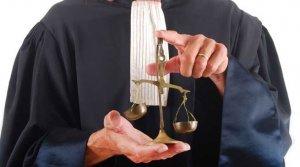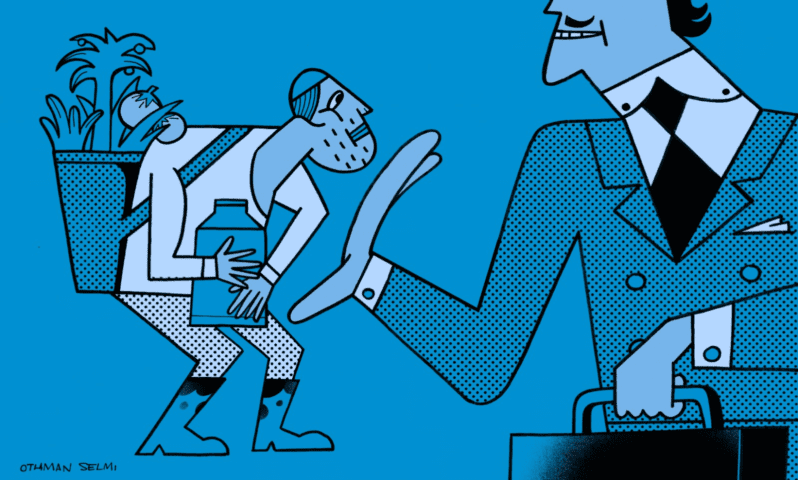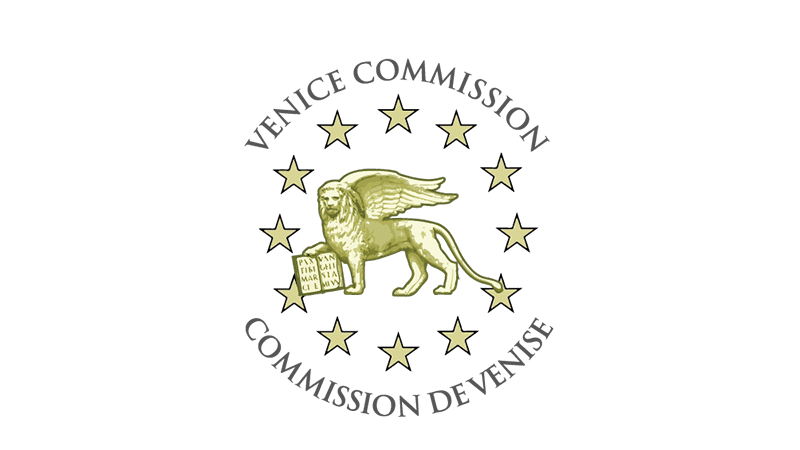Conflict Between Judges and Lawyers in Tunisia Obstructs Justice

Justice is inscribed in laws, but it is also in the judge’s head, conscience, heart, as well as in the lawyer’s morals and integrity. Judges and lawyers are an integral part of the apparatus to attain justice; if one or both are corrupt, the whole justice system is affected.
However, many followers of judicial affairs in Tunisia have been recently feeling that there is alienation, mutual envy, and antagonistic behavior between the two arms of justice [judges and lawyers] that can often have bad repercussions on both parties. As odd as this matter sounds, it is unfortunately a reality. It is not merely linked to the conflict between judges and lawyers over the composition of the Supreme Judicial Council, and whether lawyers should occupy one-third of the seats allocated to non-judges in each of its three bodies, namely, the judicial, the administrative, and the financial. It is equally connected to the course of events in Tunisia’s courts. Incidents in court repeatedly place both parties face-to-face in verbal altercations, unbefitting of both parties, and that sometimes turn physical.
A Behavior Unbefitting of Judges and Lawyers
Recent incidents included what judges saw as lawyers assaulting the Attorney-General of the Court of Appeal of Sfax, the capital of southern Tunisia, or the latter’s assault on lawyers, as perceived by the defense. These incidents are not any different from those taking place in our courts and that have come to light lately. The two parties provided conflicting accounts. In one incident that happened recently, judges claim that an attorney intentionally insulted the judiciary by swearing and cursing outside the courtroom, saying to the judges: “You are all corrupt”. From the judges’ perspective, the behavior of this attorney was not part of the defense duties entrusted to him, which makes him subject to prosecution just like any other citizen. On the other hand, lawyers cite the behavior of an investigating judge in one of the courts in the capital as the last straw. The judge reportedly left his office, assaulted one of the lawyers, shouted at him using almost the same terms “Lawyers are corrupt…etc.”, then pushed him.
Such incidents continue to happen without any response by the associations of both professions -such as the Tunisian Bar Association, the Association of Tunisian Judges, or The Syndicate of Tunisian Magistrates- in order to resolve the dispute and hold each party accountable. Many incidents occurred where lawyers who lost their cases would accuse the judge of bias, corruption, and bribery to justify their loss to their clients, or would accuse them of ignorance and inexperience. On the other hand, many judges would mistreat lawyers and would not understand their circumstances. When these lawyers plead cases in court before the judges, the latter would treat them as adversaries, rather than fellow implementers of justice. Many judges have been accused of corruption in collaboration with lawyers. One series of crises was triggered by accusations of a lack of integrity, nepotism, and violation of the laws by a judge and his lawyer wife at a court, where allegedly the lawyer [the wife] deliberately took charge of all the cases adjudicated by the judge [the husband]. Both the judiciary and the Tunisian Bar Association should be held accountable, since the two persons in question belong to both professions.
For the sake of integrity, we cannot but admit that corruption exists within our circles (judges, lawyers, administrators, police, and security). This is not surprising, as corruption exists in every time and profession, and judges and lawyers are not an exception, whether before or after the revolution in Tunisia. After the revolution, the Ministry of Justice has fastened accusations of bribery and corruption on many judges who had been previously dismissed. This was stated repeatedly by Justice Minister Noureddine Bhiri, who is affiliated with the Ennahda [Renaissance] Party (the Islamic party which ruled the country for four years before the recent elections in October 2014).
However, in all these cases of dispute, lawyers cling to the 2011 post-revolution decree that organizes their profession, especially its well-publicised Article 47. The text of said article stipulates that “No lawsuit against a lawyer may result from the pleadings and the reports carried out by them, during their profession or because of it. And they may only be subject to disciplinary accountability before the bodies, authorities, and institutions before which they practice their profession”.
Judges, on the other hand, dismiss the invocation of this article, arguing that disputed events occur outside the courtroom, thus falling under the Code of Criminal Procedure. They maintain that lawyers are not immune from accountability and that Article 47 of the Legal Profession Act does not give them the right to insult, slander, or assault judges, as they are employees whose rights are protected under applicable laws.
The Issue with Article 47
Many judges have rejected the so-called immunity of lawyers, believing that the enactment of the new law will render the judges vulnerable before lawyers, and that even if the lawyer has made a mistake and wronged the court, they will not be punished. It is essential not to misrepresent this text or elaborate in analyzing it, since this may lead to careless use of the right that the legislator has given to the lawyer.
Regardless of the possible interpretations of the term “…or because of it” in Article 47, it does not mean in any way that in the event of a disagreement, the judge cannot file a complaint; they can if the dispute has no relevance to the lawyer’s reports, or their work inside the courtroom. The article only applies with respect to the lawyer’s pleadings, reports, and mode of practice. Under the 1987 law, it was possible to sue a lawyer based on phrases contained in their reports which are presented to the court, not published to the public. It was also possible to sue the lawyer based on their verbal pleadings at the hearing. The 2011 law is merely related to these areas; it is in no one's interest to harbor the confusion or delusion that this law exempts lawyers from accountability if they assault judges. Otherwise, this would open the door to violations, especially in the chaotic situation prevailing in Tunisia after the revolution.
Acting and Reacting is Not the Solution
In this open confrontation between judges and lawyers, both parties often resort to strike. In some cases, courts are closed for a full week before litigants who would sometimes come from distant remote areas. There is no doubt that holding a strike is a legitimate and constitutional right for judges, as they are employees, just like lawyers who represent a private profession. However, this solution should only be resorted to when all other solutions have been exhausted. In practice, either the judges or the lawyers often rush to go on strike on the same day an incident takes place, with the other party following suit the day after. Those familiar with customs associated with syndicates and the ABCs of union work realize easily that these strikes are not subject to any controls, since they do not generally take place following discussions between the bodies representing judges and lawyers in search for a solution to the problem in question (due to the lack of confidence, and the widening gap between the two parties).
In most cases we monitored, the decision to strike is taken hastily, without referring to the representing bodies to discuss the matter first. More recently, conflict over the composition of the Supreme Judicial Council has stoked fears that the bodies representing judges and attorneys are seeking to win the battle, not by a fruitful debate based on legal arguments, but rather by taking advantage of certain situations to transport the battle into the courtroom, mobilize their professional base, and appear as victims. Doing so will fuel more hatred in an already tense atmosphere. In such volatile situations, politics becomes a prefered weapon of choice.
On one hand, the Association of Tunisian Judges -which was the object of heavy crackdown by the Ben Ali regime leading to a shutdown of its head office in 2006- holds itself to be the most competent and legitimate party in defending the independence of the judiciary. Members of this association had sacrificed and struggled for over five years under siege and injustice. On the other hand, the Tunisian Bar Association believes that the body of defence lawyers has always been at the forefront of guarding rights and freedoms in times of despotism, and after the revolution. The Bar also maintains that they paid a price for their stance; they produced martyrs, most prominently Shoukri Belaid. The Bar representatives also point out that lawyers are also proud members of “The Quartet” which sponsored the dialogue between Islamists and their opponents in 2013 [The Quartet is made up of the Tunisian General Labour Union, the Tunisian Human Rights League, the Tunisian Confederation of Industry, Trade and Handicrafts, and the Tunisian Bar Association]. Unlike the outcome of other Arab uprisings, the Quartet’s efforts have enabled the state to successfully draft its Constitution, taking the first steps towards the much sought after democratic transition.
How to Mend the Situation?
It is unlikely that the judges-lawyers dispute will end with the recent incidents that are linked to the conflict, over the composition of the Supreme Judicial Council. Quite the contrary, this conflict is likely to escalate with the approach of the drafting of new laws. These include those related to the Legal Profession Decree that lawyers request be revised in order to obtain further guarantees; the new judicial draft law; and, the establishment of the Constitutional Court in six months, as stipulated in the new Constitution of Tunisia. Ending the conflict is contingent on judges and lawyers realizing that adopting knee-jerk reactions to defend their positions and sectorial interests in isolation from the interests of litigants, as well as exchanging accusations of being “corrupt” -a term unbefitting of both parties- is not the solution. They must realize that resolving these disputes, as outlined in many relevant published reports based on competent research and tested cases, include the following approaches.
Refrain from ascribing a sectorial dimension to each personal problem, and recognizing that such problems may be easily overcome with the help of the bodies representing both parties;
Put public interests first. rather than divisive sectorial interests;
Form a committee of lawyers and judges representing their respective professions, to follow up on the nature of the relationship between both parties, handle complaints and refer them to the competent authorities to provide immediate solutions. This can be achieved by activating and restructuring the so-called Dispute Resolution Committee;
Reinforce the principle of cooperation between judges and attorneys through seminars, joint researches, meetings aimed at the rehabilitation of judges and lawyers, and training them to overcome the obstacles that stand in the way of justice, to defend the rights of their clients, and to work on preventing improper acts and practices; and
Hold regular meetings with the minister of justice to discuss issues related to the justice system and obstacles that hinder its progress, and to discuss lawyers’ concerns and find ways to alleviate their suffering in order to facilitate their work in a way that serves justice.
Whenever confidence is present between the two arms of justice, both judges and lawyers would ultimately defend each other’s integrity, and would refrain from exchanging insults and accusations.
This article is an edited translation from Arabic.



